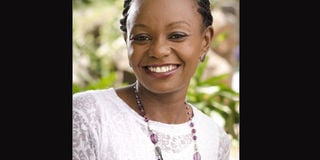You’re young; take chances and don’t be afraid to make mistakes

Kenya Private Sector Alliance (Kepsa) CEO Carole Kariuki. PHOTO| COURTESY
What you need to know:
- I let my staff know that they are the most important part of the organisation.
- I encourage them to focus on the mandate of the organisation and own it.
Speak to a college student: what is the role of KEPSA in their lives?
KEPSA is the apex body of the private sector in Kenya. Its mandate is to work with government and other stakeholders to improve the business environment. This is important for a college student because as the business environment improves, more businesses set up office in Kenya, creating jobs and opportunities that could go to college students when they graduate.
How have you gained commitment from your team and what advice do you have for young people just getting into leadership positions?
I let my staff know that they are the most important part of the organisation. I encourage them to focus on the mandate of the organisation and own it. My advice to young people getting into leadership is three-fold: one, you only compete with your goals, not anyone else’s, leadership comes from doing your best to cause impact, not as a desire to become just a leader. Two, use youth to your best advantage; use the energy, passion, innovation and time to grow. Three, make mistakes, take chances.
Has there been a time that you failed as a leader? If yes, how did you deal with it?
Failure is part of leadership. And life. I don’t even keep count of how many times I fail.
As a university student, how did you set yourself up for the job market? What would you tell today’s graduate who is struggling to get a job?
As a student, even before joining university, I did more than school work; I was involved in various extra-curricular activities as well. You have so many talents, gifts and energy - take up every opportunity you have to exploit these. There is nothing mundane. Most of all, find ways to serve your community. Also, you are young, and so you don’t know enough; even today, I have many mentors that I talk with, some for a season, while others have been in my life for decades. Life is a journey that one cannot make alone.
What is the most difficult part of your job? How do you deal with doubts, especially those that come at the point of
decision-making?
My job is exciting, but not the easiest. I work with the highest offices in the country and other countries: from the biggest to the smallest of businesses, legislators, diplomats and young people. This means I am constantly balancing interests within and across different stakeholders, and learning enough to hold relevant conversations, building strong networks to resolve business issues. This is not always easy because it is human nature to have blind spots. I consult a lot on major decisions, and when I have doubts, I have found that relationships built in the office, board level, friends and other networks are very useful during decision-making.
There are very few women in leadership positions, especially the extreme top such as you are. From your experiences and observations, why do you think this is the case?
It’s not always easy for women to ascend to the top for two main reasons: the way the society is structured and oriented is not as conducive for women as it is for men. Two, many women don’t believe in their skills and tend to go along with how the society is structured and what they have grown up hearing about themselves and about women in general. In my first few years in this role, I would hear these words not only from men, but women too, “You are so young, you are so small…” I had never thought of myself as young or small for anything. But this is changing, we are seeing more women become presidents around the world and more running big multinationals. That said, there are things in society that you learn to live with, and my advice to young women has always been: do your part, serve in your area of influence. Let your good work and determination propel you to leadership, and when there, don’t forget you are a woman, so lead like a woman with your soft skills and any other God-given wisdom.
Let’s walk down memory lane: what was the gravest mistake that you made as a university student?
I tend to forget things I don’t want to remember. The one I recall to date is not taking dual majors. I took one major because I thought it would be easy, and did not really focus on the one I thought would be tough. I ended up not doing well in the easy one, which affected my overall grade. When I decided to do my masters, I promised myself I would get the highest GPA score to prove to myself that I was capable of better. I did.
If I counted well, you are a board member of at least nine organisations. Isn’t this too busy a schedule? Is there enough time in a day for all these?
Not really, they are not that many, only a few are major boards. But even with the few boards, it is still hard, but as a Rotarian, I believe that being busy is good, and that busy people are busy for a reason. This is the motto that is used to invite individuals on boards.




